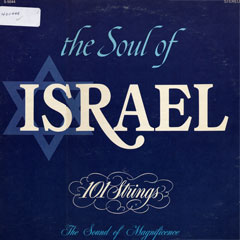101 Strings was an umbrella term for a highly successful easy listening symphonic music organization, with a discography exceeding a hundred albums and a creative lifetime of roughly thirty years. Their LPs were individualized by the slogan “The Sound of Magnificence”, a puffy cloud logo and sepia-toned photo of the orchestra. The 101 Strings orchestra was actually composed of 124 string instruments (all male except for the harpist) and was conducted by Wilhelm Stephan. The orchestra’s famous official photograph was taken in the Musikhalle Hamburg.
History
Record label mogul David L. Miller (born circa 1912 in Philadelphia, Pennsylvania) came to prominence by releasing the first Bill Haley & His Comets’ records in 1952-1953 on his own Essex label (followed by Trans-World, then Somerset). In this capacity Miller played a role in the creation of rock and roll.
Following the rise of mood music practitioners Mantovani and Jackie Gleason Presents, Miller subcontracted the Orchester des Nordwestdeutschen Hamburg (the Northwest German Radio Orchestra of Hamburg) conducted by Wilhelm Stephan to play in-house arrangements of popular standards. The first 101 Strings album was released in late 1957; an astounding 24 titles were released in 1958 (many of which featured recycled material from earlier albums attributed to the New World Orchestra, Rio Carnival Orchestra, and other light music orchestras). These records were pressed by Miller’s own plants and released through his own distribution channels (such as grocery stores).
His core staff arrangers were Monty Kelly, Joseph Kuhn and Robert Lowden. All three proved adept at penning original compositions that were stylistically consistent both with contemporary hit songs and each other. Miller placed these on 101 Strings albums to provide additional publishing revenues.
Kelly’s earliest successes were Latin and Spanish travelogues (such as the Soul of Spain series) although, following the British Invasion, he became 101 Strings’ ‘Now Sound’ specialist. Kuhn concentrated on radio-friendly numbers in the ‘Pops’ orchestral manner (“Blues Pizzicato,” etc.) which provided Somerset its initial catalog of originals. Lowden penned lounge ballads (such as “Blue Twilight”). Their body of early 1960s work would be recycled via rerelease throughout the next twenty years.
In 1964, Miller sold the franchise to Al Sherman, former Ziegfeld Follies lyricist, who renamed the label Alshire (based in Los Angeles, California) and moved recording to London. Sherman retained Miller as a partner to oversee production and A&R. The Alshire era is characterized by large-scale expansion of product, attempts to branch out into younger markets and, beginning in 1969, eventual stagnation (although late efforts by Les Baxter and Nelson Riddle were released under the 101 moniker in 1970). Output decreased from 1974 on; a tribute to John Lennon (comprised of earlier Beatle tribute material) in January 1981 marks the final 101 Strings effort.
Although many 101 Strings albums are simply orchestrated versions of pop hits and show tunes, the early Somerset material contains many examples of the exotica and lounge genres. Songs of the Seasons In Japan, Hawaiian Paradise and East of Suez are three such albums. 101 Strings Play The Blues and Back Beat Symphony comprise early experiments in symphonic-pop hybridization, while Fly Me To The Moon contains five noir-ish originals. Alshire releases include ‘Now Sound’ albums such as Jet Set, Sounds of Today and Astro-Sounds from Beyond the Year 2000, the last of which has been frequently sampled by electronic music artists of the 1990s and 2000s.
The Alshire catalog was sold to Madacy, Inc. in the 1990s and, under the direction of Greg Sims, a ‘New 101 Strings Orchestra’ began releasing a series of CDs (including a two-volume Beatles set). 101 Strings compilations were reissued on CD during the ‘lounge revival’ of the 1990s. Few 101 Strings LPs have been released in their original form.
If one goes to the Madacy site to view their 101 Strings collection, the exact same description that was used on the Bel Canto’s ST- 76 two track stereo release about the 101 Strings sound is reprinted. That annoying 50 Hz hum heard on many of those tape recordings was due to the Ampex 350’s filtering which was not well suited for European 50Hz power. The “My Fair Lady” and “King and I” releases have what appears to be the sound of dirty mixing pots used on the fly during those sessions. There were a number of tape releases that sounded like tape copies of pristine Stereo Fidelity vinyl which actually, were not all that pristine. As the selections played closer to the label, pinch distortion was evident due to the conical styli of those days. “The Soul of Spain” and “Conquers of the Ages” are prime examples of these suspicions. The same distortions exist on many of the small brand pre-recorded tapes of those days.
Source: Wikipedia


